Home > Articles > The Archives > Good Music, Good Friends: The Country Gentlemen
Good Music, Good Friends: The Country Gentlemen
Reprinted from Bluegrass Unlimited Magazine
June 1978, Volume 12, Number 12
On July 4, 1978, the Country Gentlemen will begin their twenty-second year of innovative and trend-setting music. Great changes have come to bluegrass in the last twenty-one years, and it is the Country Gentlemen who are one of the first group of musicians who come to mind when an attempt is made to trace the beginning and currents of this change. As all of us have changed and matured, the Country Gentlemen have changed as well-so much so that they, like Bill Monroe and Flatt and Scruggs before them, have become the model after which new musicians style themselves, as well as the standard by which they are judged. However, today’s Country Gentlemen are not concerned with the conceits of bluegrass history as much as they are concerned with playing good music and getting it heard by increasingly wider sections of fans the world over. It is this kind of intense dedication to their profession, together with their characteristic sincere and humble attitude towards their own artistic contributions, their fans, and life in general, that keep the Gents at the forefront of the bluegrass music field.
Each member of the Country Gentlemen is quick to assert that their musical product is the result of a joint group effort; there are no “stars” in this band-of- equals. Yet as a result of his status as a charter member of the band on lead vocals and guitar, it is Charlie Waller, with his distinctive lilting yet forceful voice, who is largely responsible for the continuity in the group’s sound over the years.
Charlie hails from Louisiana though was born in Texas in 1935, but his interest in music did not develop until he and his and extremely well-conceived, without ever resorting to a shoot ‘em up display of hot licks. His musicality defies the pigeon-hole categorization as traditional or progressive.
“As I got older,” says Doyle, “I got more into music and more adept at what I was doin’. I realized that I was going to have to do my thing, play the way I felt. There are occasional overtones of Mr. Monroe in my pickin’, but I have an individual style that I can call my own simply because I play the way I feel…I really haven’t sat down and tried to define and analyze what I do, because I play strictly by ear and from the heart. I don’t read music at all. I just play the way I feel it.”
Doyle left school for a job as a Sunny Mountain Boy with Jimmy Martin in 1963, playing of all things, the banjo. “I had more or less stopped playing the mandolin when I was seventeen,” says Doyle, “because I decided that I could get a job quicker as a banjo player.” Doyle met J.D. Crowe and was a member of his band from 1966 through August of 1971, playing guitar initially and later the mandolin. It was as a member of Crowe’s band that Doyle’s style began to find its individual personality. Doyle joined the Country Gentlemen in August of 1971.
On bass and baritone vocals for the Gentlemen is the man who knows more Dolly Parton jokes than anyone in the world, Bill Yates. Seriously, Bill is one of those rare individuals who feels like a long lost close friend the first time you talk to him. He was born in Big Rock, Virginia, located eighteen miles from Grundy, on April 30, 1935. “I’m from the southern part of Va., and we went to church quite a bit, and followed the footsteps of mothers and dads back then. Now you don’t have too much say over what the kids do, but we followed that. We liked things that were pure and things that were real. I think it grows in you. We were entertained by music—bluegrass music. We used to listen to Bill Monroe on the old Philco battery radios. That was the big thing, you’d gather around the radio on Saturday night…I loved gospel music. Dad used to sing gospel music, just to entertain ourselves with it, says Bill of his youth.
Before joining the Country Gentlemen, Bill early on picked bass with his brother Wayne and Red Allen over WWVA in Wheeling, West Virginia. A later band called the Clinch Mountain Ramblers included Bill and Wayne, along with Bill Harrell, Buck Ryan, Smiley Hobbs and Bill Emerson. Bill has also enjoyed stints with Bill Monroe and Jimmy Martin. Explaining why he originally took up the bass. Bill says, “I went to the bass because you can usually get guitar pickers but there weren’t too many bass pickers and you could work with people like Jimmy Martin and Bill Monroe because they were always lookin’ for bass players.”
Being a professional bluegrass musician was not an easy way to make a living in the late 1950’s and early 1960’s when Bill first started playing, but he harbors no resentment towards the lean days of his career. “I tell you what,” Bill says as a wide smile breaks across his face, “I loved it so good that I worked day jobs and worked music at night like four nights a week and averaged about three or four hours sleep a night for three dollars, five dollars, sometimes I was lucky if I made that. All the people that had the big jobs or good jobs, that was going to be their life, but in our situation, we couldn’t get interested in anything else but music, and regardless if you starved, that didn’t make any difference, because you had a goal. You set up a goal and you want to make that and it’s taken a lot of willpower. You give up a lot of things in life to do that. But it’s paid off: now I have a nice home and a new camper, a new truck, two cars and I’m a third owner in a Silver Eagle bus, so I think I’m being paid back from when I paid my dues.”
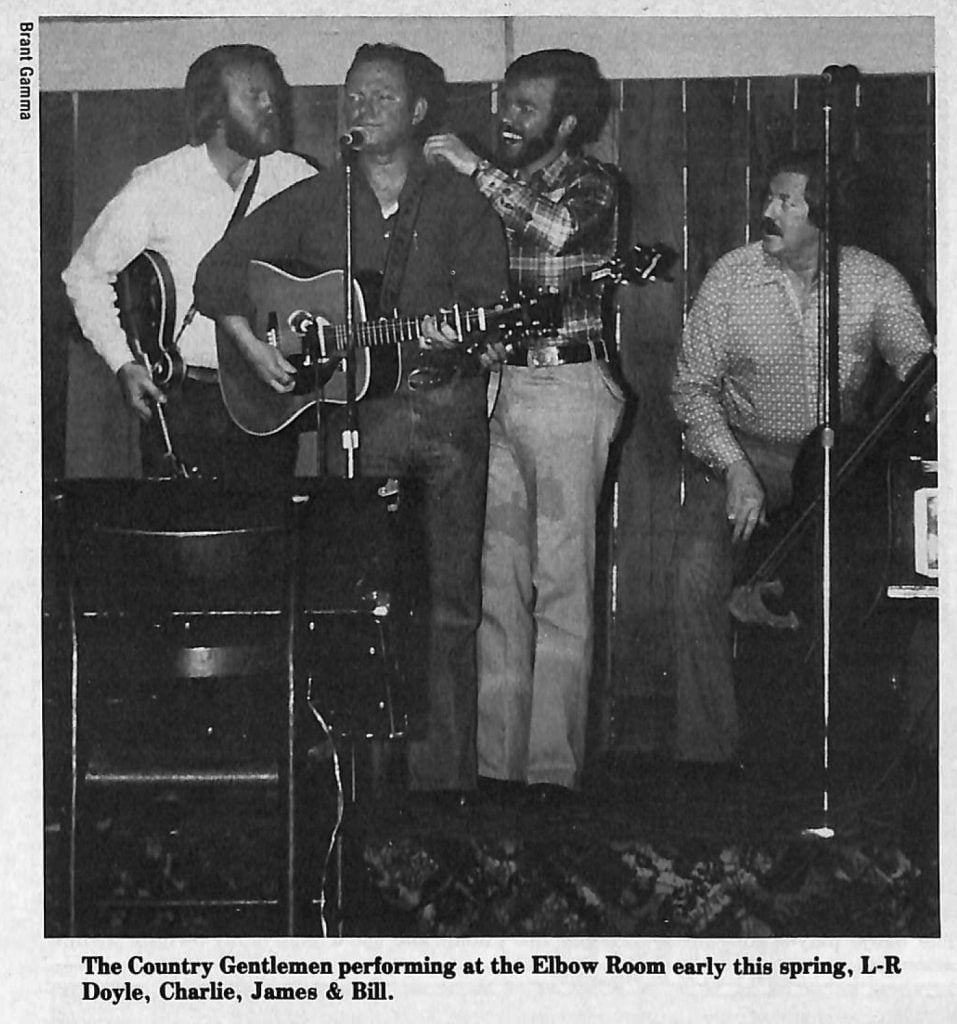
The youngest member of the Country Gentlemen is the group’s twenty-one year old banjo player, James Bailey, who hails from Keysville, Virginia. James’ first instrument was the guitar, which he took up at the age of seven. “My family was always involved with music at sometime and still are. I played the guitar until I was eleven, and then I took up the banjo. The banjo player that influenced me the most was Sonny Osborne. He was the first banjo player that I ever really heard. Later on I got turned on to Bill Emerson and, of course, Earl Scruggs and all of the greats of the bluegrass music field. I played with mostly local bands first, like everybody else. When I was sixteen, I joined the Country Gentlemen and stayed ten months. Then I quit and I went back home and had a band of my own for awhile (Harvest), and it was going along pretty good, but there was a lot of work involved, more work than I had anticipated. Between the first time I played (with the Gentlemen) and the second time, Bill Holden was playing the banjo. I heard he was leaving, and I’d grown up quite a bit over the two years and I decided that pickin’ a banjo was what I’d like to do as a career. I really didn’t have any desire to play with anybody else. I figured that probably the Country Gentlemen would be a home for me. I figured my style fit their music better than anybody else I could think to play with.”
James’ playing has the rhythmic precision, bounce and punch reminiscent of Bill Emerson’s banjo work with the Gentlemen. However, James brings to his music his own new ideas and ways of looking at things. With one foot deep in the traditional styles of Osborne and Emerson, James brings new life to instrumentals such as “Steel Guitar Rag” or the Gentlemen favorite, “Yesterday.” James is at present planning to record an instrumental album of banjo pieces.
In the form of both stylistic innovation and the introduction of new material to the field, the Country Gentlemen’s contributions to bluegrass are practically inestimable. In addition to expanding the musical awarenesses of countless bluegrass fans, the Gentlemen have introduced numerous listeners to the music who might otherwise have been closed to bluegrass in its more traditional forms. For the present-day Gentlemen, innovation is simply part of the necessary and natural operation of the same need for self-expression that motivated Bill Monroe to create the style in the 1940’s.
The band is not concerned with the question of whether or not their music exhibits the necessary qualities to be called bluegrass; good music, in whatever stylistic form it may take, knows no boundaries in its power to move the human heart. Bill Yates says, “I think that really Country Gentlemen music is considered bluegrass, but I think Country Gentlemen music is just Country Gentlemen music. Banjo, mandolin, guitar and bass have been brought up since 1934 to being branded with bluegrass, which we don’t mind, but I think we should be considered a little bit more than bluegrass, because of all the material and the arrangements that are being used.”
Similiar sentiments are expressed by Doyle Lawson, “When bluegrass first originated was about 1945 when Flatt and Scruggs and Monroe and, I think, Chubby Wise and Cedric Rainwater were the Blue Grass Boys and they were expressing themselves and exploring and introducing new ideas to the people. It created a different music for the audience to listen to. Let’s face it, it has to grow. Anything that doesn’t grow, doesn’t experiment with change, will die. It’ll quit, it’ll stop.
“I think the people who have come along today, what you would call superpickers like Tony Rice, who is really a terrific young guitar player, he is expressing himself and introducing his ideas to the public, the way he feels it, the same way we do. We express ourselves. This is the way we see our music. If you want to call it bluegrass, okay, but this is the way we think it should be played. We’re expressing to the public our ideas and feeling towards them. The New Grass Revival, J.D. Crowe have a different style. All in all, I think it’s really good that people are exploring and introducing new ideas.
“I’m not against a little drums behind the music. I think it really adds to it. The drum is not an electrical instrument, it’s an acoustic instrument,” continues Doyle, “people will say it wasn’t original. Well, neither was the Dobro. For it to survive, the music has got to change and it has to undergo some sort of change. It has to have new talent, good talent, people that really love it. But people that were born in 1960 and getting into the music are not gonna feel about it the way the people did that were born in 1920 or 1930 or ‘44, when I was born. It’s different because the world has changed so much since bluegrass originated.”
The future direction of the band is best summed up by Charlie Waller when he says, “I think everybody creates their own style. We have already done that. We’re not looking to bite off anymore style. We are just looking to find new and interesting things to add to it. You can’t sing the old things over and over and over. You’ve got to find some new stuff, something that you like.” The Gents have recorded an album for Rebel records of gospel songs that will be released very shortly. They are presently working on another album which has generated a lot of excitement among the band members. The group sound on the new album remains much the same as on previous albums. However, there is more commercial material on the new effort, such as “Darby’s Castle,” a lesser known Kristofferson composition.
Like many other bluegrass groups, the Gentlemen are discouraged and frustrated by the narrow-mindedness of most AM country music radio station program directors towards bluegrass music. The music and its performers remain largely an underground movement because of the inability to break into major entertainment markets in this country—Charlie feels especially strongly about the issue of bluegrass and radio play. He says, “We get plays on all the bluegrass-oriented shows and thank God for ’em, we love ’em, but we’d still like to get on some AM country stations too. I’ve always felt that there’s some dirty pool about getting a record in the charts. We’re America’s number one music, because bluegrass is real American country music as far as I’m concerned. It just doesn’t get the shake it’s supposed to.
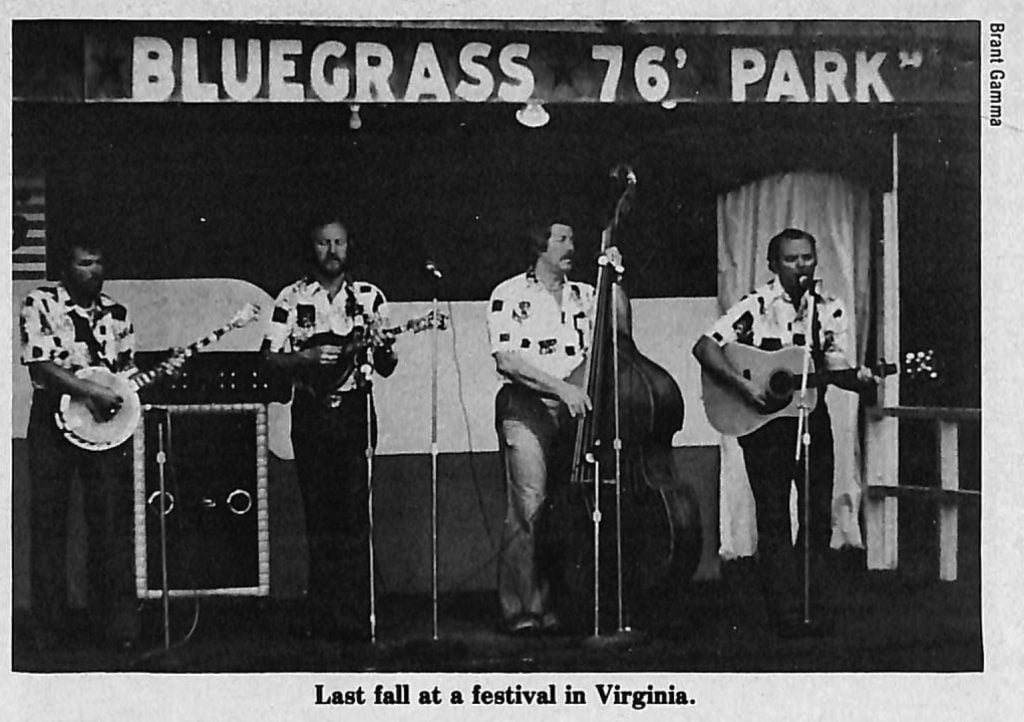
“I think you’ve got to pull strings and there’s something in back of it somewhere, maybe. I’ve said this before, but I think it’s just controlled by people who really don’t want bluegrass to be anything other than music for television commercials. I think we’ve got stuff as good as it takes. But unless you’ve got someone to get it out there to where the people can hear it, then you’re just whistling in the wind as far as the real radio play goes. I would love to see that trend one day be broken and have the people getting bluegrass played on the radio, not through just buying it on there, but through the fact that enough people like it and they can write into the radio station and the radio station can play it and not be afraid to play it.
“For instance, one of the songs on our last album (“Ages and Ages Ago”), a lot of people wrote in and wanted to hear it because they played it a few times. It was on a radio station not too far from here (central Virginia). An awful lot of people wrote in and said they really liked it. Because the DJ took a chance and played it, it got a lot of response but they had to stop playing it. The announcer lost his job over it. I just don’t have too much use for that kind of carryings-on.”
The first step towards cracking the mass market for many bands has been to land a contract with a major recording label which possesses the needed money and experience to offer wide publicity and exposure for a new group. This the Country Gentlemen did in the early 1970’s when they went with the Vanguard record label, an organization well-known for its high artistic standards and a wide-ranging selection of artists and styles of music. The Gentlemen produced two albums for Vanguard, “The Country Gentlemen” (VSD-79331) and “Rememberances and Forecasts” (VSD-79349), both of which contain thoroughly high-quality, well-performed modern bluegrass.
Many people, including the Gentlemen themselves, became excited at the prospect of an unadulterated bluegrass band having the opportunity to reach so many new listeners. But the initial excitement turned to bewilderment and finally bad feelings as internal problems within the Vanguard organization left the Gentlemen and their two albums up on the shelf to be ignored.
Says Bill Yates of that period, “We’d go into town, and there would be a different publicity man every time we went to New York. Somebody would come to the recording studio and would want to know a biography on the Country Gentlemen and we’d have to go through this every time we’d go into town. So, this is saying to us, if they can’t keep employees to work for them, what are we doin’ here? We’re out in the cold as far as they were concerned because they were not going to push bluegrass.”
Doyle adds, “We thought, man, they’re really gonna do it to us. They’re gonna push us, but it just didn’t come about. We could go into New York City and to a show and nobody from our record company would even come down and watch us…We were so disappointed…They wouldn’t get out and promote. They just would not do it.”
The Gentlemen have since moved back to Dick Freeland’s Rebel Records label. Charlie reflects the group’s attitude towards the label when he says, “Rebel is considered a bluegrass label and we’ve always been pretty close to Dick, and to know that you do get a few dollars once in a while from royalties makes it worthwhile. We decided to stick with Rebel because they had been fair to us. We have recorded with a lot of different people and nobody has been as fair as Rebel, because we grew together, we made each other.”
One of the undeniably good things about the many changes that have come to bluegrass music is the increasing use of large multi-tracked recording studios for recording purposes. The greater efficiency and ease of modern recording techniques shows a band at its musical best. “If we’re doin’ a take and somebody goofs, usually me, we just go on because I can always go back and re-do it. That’s really the super part about it,” says Charlie. The Gentlemen have used a 16 or a 24-track studio for their recent albums, yet the “Award Winning” LP (Rebel SLP-1506) of some years back was recorded in Roy D. Homer’s basement 2-track studio.
In answer to the question of how the great music on that album could possibly be captured with only two mikes, Bill Yates answers with his characteristic humor, “Well, Roy wouldn’t allow his wife and kids to flush the toilet or turn the heat on, while we were in the basement recording. So you’d go up sometimes to use the bathroom and here are his wife and kids all wrapped up in blankets! I think he did a great job for what he had.”
The Country Gentlemen spend between 175 to 200 days a year on the road, playing to wide variety of audiences from coast to coast. While such a busy road schedule sometimes proves tiring, the enthusiasm of the band for their music always remains high. “We want to go up there and have a really good time playing good music. That’s what it’s all about,” says Charlie. “To go out there and have a good smile on your face through the whole set is the most important thing. You have to show the audience that you’re having a good time performing for them.”
When this kind of performance attitude is combined with an appreciation of the fans whose support has placed you at the top of the field, the result is that special brand of honest, good-natured, open professionalism which has trademarked the band for many years.
The Gents are never too tired to autograph another album or shake another hand or even jam a little with the local musicians after already having played three sets in a smoke-filled club. Doyle gets at the heart of the matter when he says, “We appreciate all the people that do support us and come out and see us. They take care of us. They make it worthwhile for us to keep doing it. We want the people to know that we do appreciate them. We try to be just regular people. You have to establish this communication between you and the people. I really believe to be always friendly and courteous, always take your time and talk to the people, because they come, they pay their money and they want to talk to you because they like your music. I personally have little use for any entertainer who doesn’t take time to talk to the people who support him.”
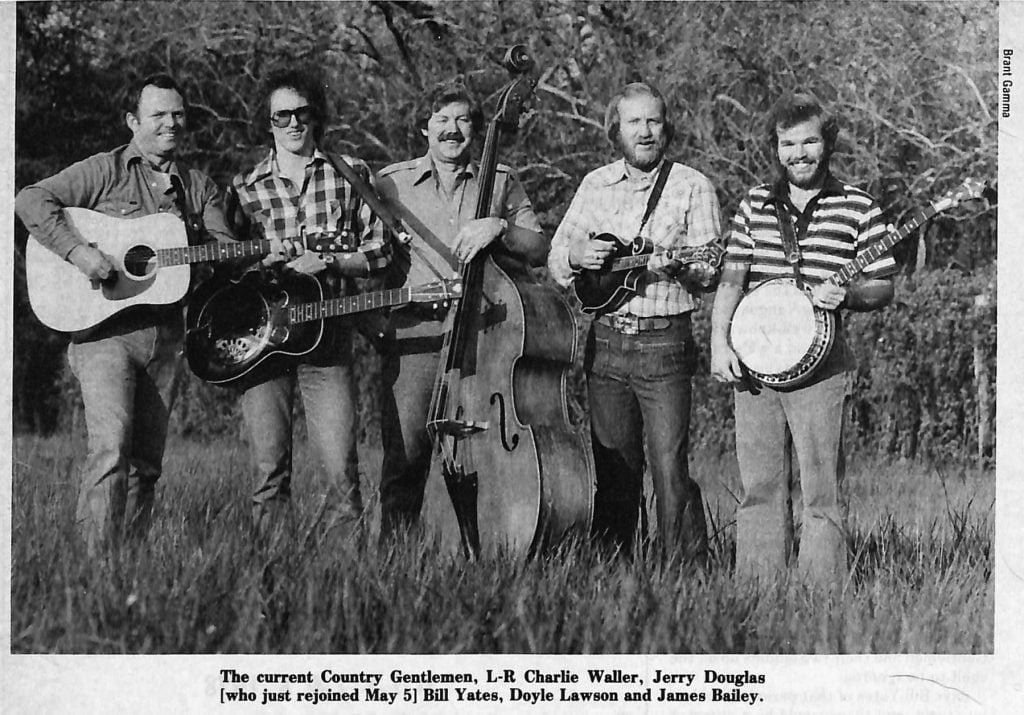
The Country Gentlemen occupy a special place in the hearts and minds of many bluegrass fans and musicians. The songs they have made famous stay with you, like old friends (for instance, how many times have you been driving on a country road on a dark and stormy night and have been unable to resist glancing to the back seat just to make sure that “Mary wasn’t there”). By changing the music to express their own inner needs, they have changed all of us by tearing down a few musical barriers and showing us new possibilities. As the Gentlemen have never lost the awareness of where they have come from, neither must bluegrass lose its sense of tradition. We are all lucky that the Country Gentlemen are still around, playing great music. All of us would certainly be a little worse off without them.
Ed. Note—After this article was completed the Country Gentlemen announced that the fine Dobro player Jerry Douglas has re-joined their group.
Share this article
1 Comment
Leave a Comment Cancel Reply
This site uses Akismet to reduce spam. Learn how your comment data is processed.
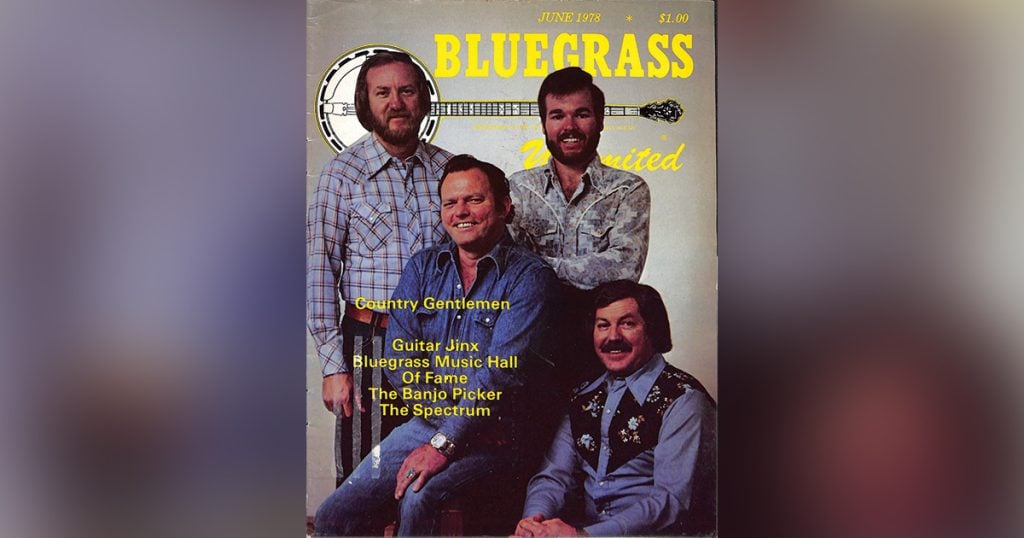
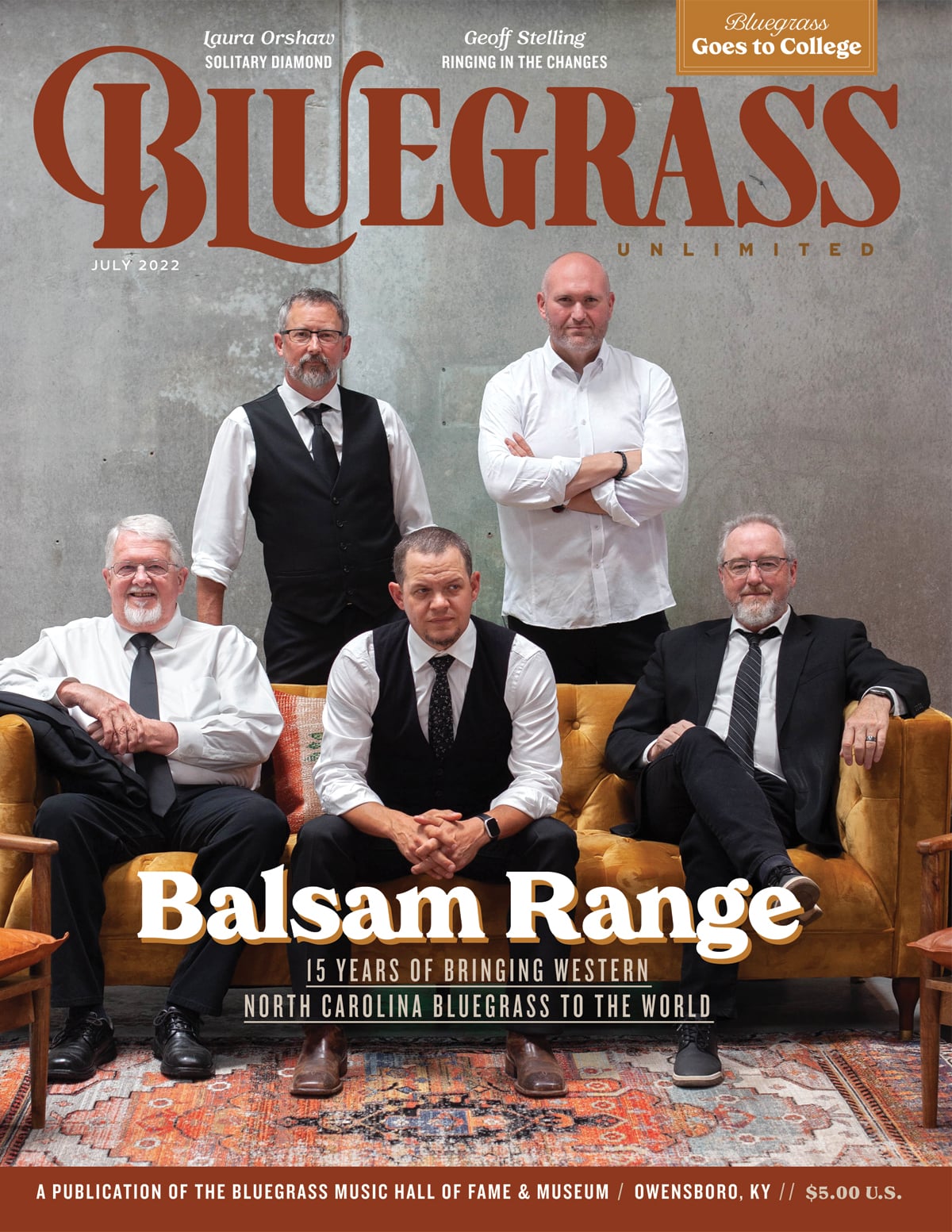
Excellent article; I enjoy the history of those dedicated survivors.
jim